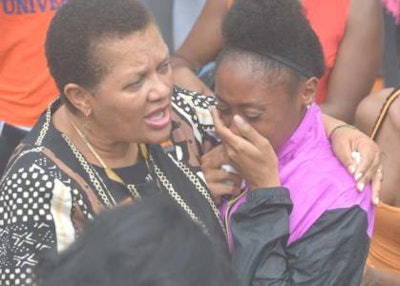 Dr. Cheryl Dozier, president of Savannah State University, comforts a grieving student.
Dr. Cheryl Dozier, president of Savannah State University, comforts a grieving student.SAVANNAH — Officials at Savannah State University have been trying to quell student concerns that their campus is not safe, following the shooting death of a 22-year-old junior during an altercation in the school’s Student Union building last Thursday.
“Savannah State University is a safe place for our students to attend,” said Dr. Cheryl Dozier, president of the oldest HBCU in Georgia. “Each of our students’ lives are precious and valued.”
The campus was placed on lockdown on Thursday night and the university delayed the start of classes and brought in grief counselors on Friday. To calm fears, university officials also sent students, staff and faculty members an announcement saying that they had beefed up security efforts across campus.
“The safety of those who live, study, work and visit Savannah State University remains a top priority ― no exceptions,” the statement read. “Savannah State University has zero tolerance for violence of any kind. If students are aware of the presence of weapons, please think and act responsibly to disclose such information to a member of the faculty, staff or administration, or other figure of authority. While it may be natural to want to protect an associate, the lack of disclosure may do more harm than good in the long run.”
Still, the on-campus shooting of Christopher Starks, a mass communications student from the Atlanta area, has been unsettling for students who recently returned to campus for a new academic school year.
The shooting also has called into question the safety at HBCUs in general, particularly those situated in urban areas.
The Georgia Bureau of Investigations said that the campus shooting was a result of an argument that turned deadly. The suspect is still at large and no arrests have been made.
Starks, a former football player who transferred to Savannah State from Appalachian State University last year, was popular among his fellow classmates. At a vigil held on campus on Friday, some recalled that he enjoyed fashion and was an aspiring rap artist.
Back in DeKalb County, located a few miles outside of Atlanta, family members said that Starks was focused on his education and his career aspirations.
“He wasn’t a street runner,” said Collier Starks, the victim’s uncle. “He wasn’t a drug, dope boy; he was none of that.”
The number of shootings on HBCU campuses has increased over the past few years. In recent months, students have been shot and injured at Johnson C. Smith and Miles College.
Jamal Eric Watson can be reached at [email protected]. You can follow him on Twitter @jamalericwatson.















